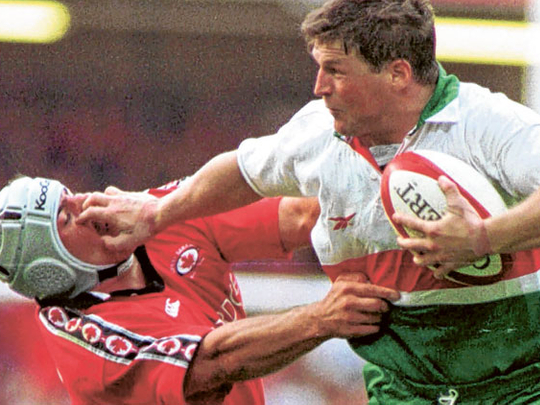
Dubai: Former Welsh Rugby Union inside centre Scott Gibbs believes the Tri Nations should have been cancelled this year as it falls too close to the forthcoming International Rugby Board World Cup and could dearly cost "over-worked" southern hemisphere teams like South Africa.
Gibbs, who will provide punditry for OSN Sports One for all 48 matches at the World Cup in New Zealand from September 9 to October 23, spoke exclusively to Gulf News yesterday.
New Zealand, Australia and South Africa are already into their Tri Nations series which started on July 23 and wraps up on August 27. So far, defending World Cup champions South Africa have lost to Australia 39-20 and New Zealand 40-7, amid conspiracy accusations that the Springboks are saving their best players for their Webb Ellis defence.
Gibbs said: "They perhaps should have scrapped the Tri Nations on World Cup year just to give everyone a little bit of respite before the World Cup. What the global audience wants to see is the Schalk Burgers' and Andries Bekkers' play. They don't want to see them trip over at the Tri Nations and be injured."
"Rugby players and more so rugby supporters pay the price for too much competitive rugby and this year has been relentless if you've watched 20 rounds of Super Rugby and then the Tri Nations. There are a lot of tired bodies now and more than ever it's a matter of keeping everybody fit and boiling over for the start of the World Cup."
Complete package
That said, Gibbs believes the Webb Ellis trophy won't fall into the hands of less-fatigued northern hemisphere teams.
"I think Australia for me represent the most complete package from a rugby squad perspective and certainly going into the spring the competition on good weather tracks. It will be the team that can create and can execute well who will succeed.
"It's about how you can break up your rugby over that six week period. I think the smart money is either on Australia or New Zealand. If you compute the draw that's what the final should be unless there's a major upset in the quarters or semis."
Gibbs added of New Zealand, who have choked in previous tournaments despite "the favourites" tag.
"They've played so much rugby in those early rounds clocking up cricket scores that when it comes to the clutch games they've tried to maintain rhythm and momentum by playing open and expansive football instead of playing how you need to — weighing up the clock and engineering a win and that is where they've fallen short."
"That's all about game management and performing on the day, keeping your forwards going forward and keeping the score board ticking over rather than counting the passes and playing attractive rugby. They'll be mindful of that as it's been their Achilles heel in every World Cup since 1987."
Believing that Australia and New Zealand will waltz through the competition, Gibbs was more sceptical about South Africa.
"Australian franchises have probably come out of Super Rugby more intact because their local derbies are not as ferocious as South African derbies," he said.
Paying the price
"I think South Africa has paid the price for an extended Super Rugby season and with those derbies taking so much out of them it was just wise to take those guys off and keep them in cotton wool."
"They are quite arguably in the most physical group with Samoa, Wales, Fiji and Namibia. A lot of tired bodies will come out of that group and then the quarters where its essentially not good rugby. They've got some heavy work to do before the knockouts."








